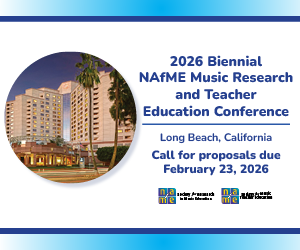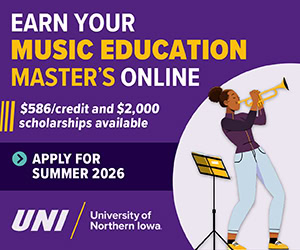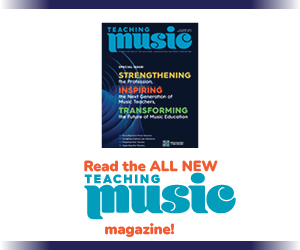NAfME BLOG
What Is the Most Important Thing You Want Your Students to Learn from You?

/ News Posts / What Is the Most Important Thing You Want Your Students to Learn from You?
What is the most important thing you want your students to know and be able to do as a result of their time with you in music class/rehearsal this year?
This article was first published in the January 2024 issue of Teaching Music.
 Adam DeVault
Adam DeVault
Director of Bands at Derby High School and Instrumental Music Chair for Derby Public Schools
in Kansas
Above all else, I want my students to love music, understand its importance, and work to be a contributing member of something bigger than themselves. At Derby High School, we strive to foster a lifelong love of music. Through learning to perform music at a high level in our program, students will develop an understanding of and a passion for music. We hope at the very least students from our program will leave as educated consumers of music. Further, we encourage them to continue to perform either in college (no matter their major) or in community groups throughout our area. We encourage students to continue their music study beyond our program and Derby High School. We work to make sure students feel connected to music and to each other as performers and that this sense of community (music community) carries on throughout their lives.
 Jenny Collins
Jenny Collins
Director of Bands, Pikesville Independent Schools in Kentucky and Adjunct Saxophone Instructor at the University of Pikesville
I teach my students that the integrity of the process is what produces the highest quality learning and advancement in their performance. We start out by reviewing the fundamentals, which result in beautiful, characteristic tone production. Fundamentals include correct posture, embouchure formation, the angle at which the instrument is held, mouthpiece placement and pitch (for single reeds), voicing, breath support, air speed, aperture shape, teeth placement, flexibility, and using the highest quality reeds and equipment available. We review the most efficient hand positions and placement, neck strap length, and curvature of the fingers. My students perform long-tone exercises to coordinate these aspects while producing a consistent air stream. For percussionists, we review the correct stroke, grip, finger placement, and techniques used for each instrument in the ensemble.
I use the time at the beginning of the year to firmly establish the importance of fundamentals and a process by which they can improve throughout the year. Part of what I call the “integrity of the process” includes the idea that good people make good bands. I have a student leadership team, but also teach my students that everyone is a leader. The way we build an outstanding band is to work together toward goals that all the members know and understand.
My students understand that discipline is the gift you give yourself and your team. They understand that professional performance happens in spaces that are clean and organized, and that it is their responsibility to maintain this space. When they take ownership of the program by taking charge of their musical development, the organization of the room, the equipment, the music, loading and unloading the truck, our service projects, and recruitment and retention activities, then we are moving forward toward our shared vision.
 Eugene Butler
Eugene Butler
Director of Bands at Smiths Station High School in Alabama
As I enter my fourteenth year in education, my philosophy of music education has evolved from my very first teaching job. Students have always been at the center of my philosophy. Over the years, though, my focus has shifted from where students would end up as musicians to where they would end up as individuals. I hope that my teaching and inspiration instills a love of music in each student, and I hope this love of music allows each student an opportunity to continue music after they leave my band room. I am a band director now due to the positive influence my high school band director had on my life. That is the positive impact I strive to have on my students. Most of my students do continue music in some capacity after they leave my band room, but not all of them. All the students, though, move on to the next chapter of their life, whether college, military, trade school, work force, or other path.
The acronym P.R.I.D.E. and four vision statements guide everything we do as a band program. Persevere in everything you do. Respect yourself and each other. Integrity is always most important. Discipline is the key to success. Enthusiasm helps each other through encouragement and excitement. Our band program works closely with school administration and faculty to produce servant-leaders who engage themselves in community service projects, outreach opportunities, and the school community. The program produces class individuals who represent the band program and high school in a manner of excellence; it is an integral part of school life and positively impacts and influences the community. Our goal is to become a model band program locally, statewide, and nationally.
Through the hard work of our students, our band program has been chosen to perform at university honor bands and state conferences, most recently being chosen to perform at the 2023 Alabama Music Educators Association Professional Development Conference. I hope that our students remember these performance opportunities as positive experiences and that they remember the life skills and lessons they learn from their time in band. This year, I want students to leave the band room with a feeling of success and that they have the tools to be productive individuals in their community and in society.
 Ebonee Woodland
Ebonee Woodland
Band Director at North Side High School in Jackson, Tennessee
Over the past few years of teaching, I’ve noticed students have been more afraid to make mistakes and receive feedback to improve. Because of this, I’ve noticed my students are shy to try something without me walking them through step by step or without the assurance that they will not fail.
Several students have become afraid to try new techniques or new skills or new pieces of music. I want students to feel comfortable with the uncomfortable, which has been my slogan for my group this year. I advise them, “Allow yourself to try something different and be okay if it does not work out the first time.” Usually, it is within the failures that students grow and build in multiple areas. I want them to take away the idea that mistakes are going to happen, and it is okay to fail just so they can learn from it.
 Larry Blocher
Larry Blocher
Retired Dean of the College of Communication and Fine Arts Director for the School of Music at Troy University in Alabama
I was blessed to spend much of my teaching career in higher education surrounded by terrific colleagues who were always willing to share. My courseload included conducting instrumental ensembles and teaching instrumental methods courses including Band Techniques, an upper-level music education course. While Band Techniques was a required part of the curriculum, the structure of the class—content, experiences, techniques, expectations, assessments—was generally up to me. As I considered what I wanted my students to know and be able to do, I realized they lacked real-world opportunities to apply or use much of the information I was providing. Ultimately, I decided to present a wide variety of foundational topics so that when they were ready, they could decide how or if they could use the material in context as they continued to learn on their own. I wanted them to realize the importance of considering new ideas, approaches, and opportunities thoughtfully while they continued to develop and refine their skills and knowledge. Students need to remain at the center of our decision making as teachers.
 Michelle McDonald
Michelle McDonald
Band Director, Tuscaloosa Magnet Schools Middle and co-leader of the Music Industry program in the Tuscaloosa Fine Arts Academy at Paul W. Bryant High School in Tuscaloosa, Alabama
As a result of their time in my classroom, my students will achieve excellence, because they know that excellence is the expectation and the only outcome that will be accepted. They will have clear mastery goals that they set for themselves, goals we set together, and goals that are set for the ensemble. By setting clear goals and encouraging students to reflect on their progress, my students see their improvement and celebrate their achievements, no matter how big or small, which fosters a sense of accomplishment and motivates them to keep pushing their boundaries.
My students work collaboratively with their ensemble mates to create their interpretation of the music selections, and they execute that interpretation with emotion, passion, and musicality. My students create beautiful music, and they will make mistakes. But they will know that those mistakes are just part of their learning journey and not an indication of failure.
I want my students to know they are loved and valued as individuals and musicians, they are capable and creative, and they can use the tools and strategies we learn in class to continue lifelong learning and music making. Ultimately, my goal is for my students to leave our class time with a sense of pride in their growth, a deep love and respect for music, a sense of self-confidence, and the ability to face challenges head on with determination and resilience.
The future of the world is in my classroom today, and I hope to inspire not just great musicians, but empathetic and confident leaders who will leave the world a better place.
What do you want your students to learn from you and take away from your music program? Share your thoughts on Amplify!
Did this blog spur new ideas for your music program? Share them on Amplify! Interested in reprinting this article? Please review the reprint guidelines.
The National Association for Music Education (NAfME) provides a number of forums for the sharing of information and opinion, including blogs and postings on our website, articles and columns in our magazines and journals, and postings to our Amplify member portal. Unless specifically noted, the views expressed in these media do not necessarily represent the policy or views of the Association, its officers, or its employees.
Published Date
February 21, 2024
Category
- Ensembles
- Lifelong Learning
- Social Emotional Learning
Copyright
February 21, 2024. © National Association for Music Education (NAfME.org)




